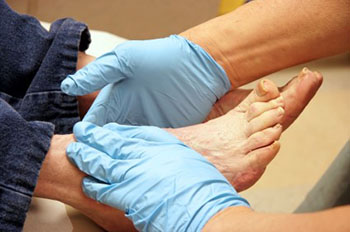Diabetic Foot Care

Diabetes is directly linked with profound changes to your feet. Both Type I and Type II diabetes can be harmful to feet so it is essential that everyone with diabetes visit a Chiropodist because of the risks of developing diabetic foot disease.
Diabetes is a life-long disease that over time can cause damage to nerves and blood vessels leading to loss of feeling and decreased circulation in your feet.
The circulation to and around your feet can deteriorate meaning you are more susceptible to infection, less likely to heal quickly and your skin quality reduces meaning it is easier to damage. The sense of feeling in your feet can also reduce so that it is possible to damage your feet and not know about it. This is called neuropathy.
This is why it is important feet are monitored regularly so that changes are detected early on.
You can see how even seemingly simple problems like corns, callus or poorly looked after toenails often manifest as more complex, urgent problems or emergencies.
Examples of factors which increase your risk of developing complications of diabetic foot disease such as infection, ulceration, amputation or hospitalization include the following:
- Signs of diabetic foot disease
- Increased pressure areas under your foot
- Reduced ranges of movement in your feet
- Sites of prior amputation
- Deformity of toes or the foot
- Reduced blood flow to your feet
- Diminished nerve function in your feet
- Reduced Sensation in your feet
- Reduced skin quality
- Toenails in need
- A History of Foot Ulceration
- Signs of an urgent problem
- Or other systemic disease leading to risk
What are the basic guidelines for diabetics between chiropody visits?
- Wash feet daily and dry thoroughly – especially between the toes.
- Apply moisturizing cream to your feet daily but not between your toes.
- Check your feet daily for anything unusual – colour changes, breaks in the skin, swelling, discharge etc.
- Seek medical attention urgently if these are noted.
- Always wear shoes or house slippers on your feet to protect them.
- Ensure your shoes are the correct fit and are adjustable – low heel, laced shoes are the best.
It is important for you to take exceptionally good care of your feet and to follow any advice given to you!
We provide comprehensive diabetic footcare and education.
Our comprehensive diabetic foot screening, including the ability to undertake vascular testing helps us identify the risks of you developing serious foot complications. We are able to help develop a plan to manage the risks we identify that may include regular screening and diabetic foot care, regular advice and education and the prescription of diabetic footwear and diabetic orthotics and the treatment of foot ulcers and wounds. Call us to book now.
